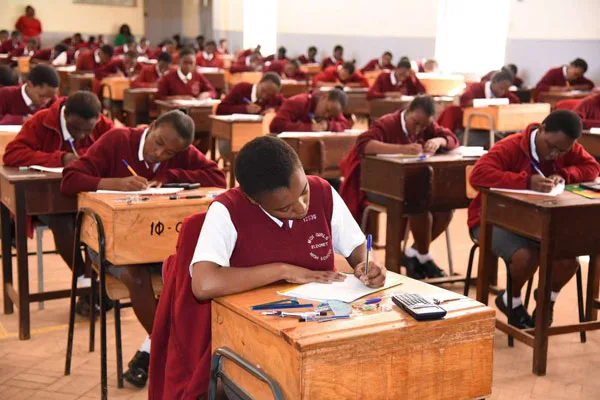KNEC Sets Strict Rules for Mid-Year KCSE Exam, Bars Regular Students.
The Kenya National Examinations Council (KNEC) has introduced new regulations for the mid-year Kenya Certificate of Secondary Education (KCSE) examination scheduled for July 2025.
The registration, which began on Monday, 26th January 2025, follows the council’s earlier announcement introducing this mid-year examination cycle.
This will be the first mid-year KCSE exam, distinct from the traditional November series.
Exam Eligibility and Restrictions
Three groups of candidates will be ineligible for the July KCSE exams:
- Regular School Learners: Students still attending secondary schools.
- First-Time Candidates: Those sitting for the KCSE for the first time.
- Unqualified Applicants: Individuals failing to meet KNEC’s registration criteria.
Dr. David Njengere, KNEC Chief Executive Officer, explained that candidates in these categories cannot participate as the KCSE is designed for a four-year curriculum, which they would not have completed by July.
The mid-year exam targets specific groups:
- Repeaters: Those retaking the exam, either as full repeaters (registering for seven or more subjects) or partial repeaters (fewer than seven subjects).
- Missed Exam Candidates: Individuals unable to sit for previous KCSE exams due to unavoidable circumstances like illness.
- Adult Learners: Independent candidates with proof of primary education qualifications.
All repeaters and private candidates must register for the July exam, excluding them from the November series.
However, learners taking KCSE for the first time or those failing to meet KNEC’s stipulated qualifications are ineligible for this cycle.
Registration Process and Deadlines
The registration period for the July KCSE series runs from 27th January to 21st February 2025. Registrations will be handled at county headquarters under the supervision of County Directors of Education (CDEs) via the KNEC portal.
Candidates must provide:
- KCPE certificates or equivalent qualifications.
- KCSE results slips for repeaters.
- Identification documents (National ID, Birth Certificate, or Passport).
- A passport-sized photograph (300 x 300 pixels).
Each candidate must pay Sh7,200 for registration. KNEC emphasized that no changes to candidate details, including photographs, will be allowed after the registration deadline.
Concerns Over New Guidelines
Educators and stakeholders have expressed concerns over the timing and communication of the new guidelines.
According to KUPPET Narok branch executive secretary Charles Ng’eno, some students re-enrolled in schools and paid fees, only to face uncertainty due to the restrictions.
Bomet KUPPET branch secretary Paul Kimetto argued that KNEC should allow these candidates to sit for the November exams to ensure adequate preparation.
He also suggested that KNEC could consider creating a separate exam series for repeaters in November.
Stakeholder Feedback
Some school principals reported that students have enrolled in lower grades to meet preparation demands, while others face challenges in proceeding with their studies.
Members of the education sector, including Bomet County Education Board’s Stephen Koskei, criticized the lack of public participation before issuing the guidelines.
Koskei emphasized the importance of inclusive consultations to avoid disadvantaging students.
Examination Requirements and Timetable
KNEC reiterated that existing KCSE regulations, as outlined in the Revised Regulations for KCSE Examination (2024) and the User Guide for Management of the Kenya Certificate of Secondary Education (2024), will apply.
Key requirements include:
- Accurate personal details during registration (e.g., names, year of birth, and citizenship).
- Adherence to subject clusters for grading.
- Specific accommodations for candidates with disabilities, categorized as visually impaired, hearing impaired, or physically impaired.
The July KCSE timetable features:
- Project-based Assessments: Art and design, agriculture, woodwork, metalwork, building construction, and computer studies (January–July 2025).
- Theory and Practical Papers: Conducted from 1st July to 1st August 2025.
Read Also: KESSHA Appeals for Capitation Increase as Rising Costs Force Schools into Debt
KNEC’s Reassurance
Dr. Njengere urged all education officers and candidates to comply with the outlined requirements to ensure smooth registration and examination processes. He reassured the public that repeaters from any year can participate, provided they meet eligibility criteria.
“Proper documentation is mandatory for successful registration,” Dr. Njengere stated, emphasizing the importance of adherence to KNEC regulations to avoid complications.
KNEC CEO David Njengere stated that the introduction of the mid-year series aligns with the government’s efforts to phase out the 8-4-4 system, with the final KCSE exams under this framework scheduled for 2027.
The government recently announced the July series as part of education reforms. This initiative aims to provide opportunities for candidates to retake exams and cater to adult learners, fostering inclusivity during the transition to the new education system.
Education stakeholders await further clarification and adjustments to ensure the success of the new mid-year exam model.
Summary Table
| Category | Eligibility | Fee | Deadline |
|---|---|---|---|
| Full Repeaters | 7 or more subjects | Ksh. 7,200 | 21st February 2025 |
| Partial Repeaters | Fewer than 7 subjects | Ksh. 7,200 | 21st February 2025 |
| Adult Learners | Proof of primary education required | Ksh. 7,200 | 21st February 2025 |
| Previous Candidates | Previously registered but did not sit for the exams | Ksh. 7,200 | 21st February 2025 |
KNEC Sets Strict Rules for Mid-Year KCSE Exam, Bars Regular Students.
Follow Teachers Updates on Facebook, LinkedIn, X (Twitter), WhatsApp, Telegram, and Instagram. Get in touch with our editors at [email protected].



Discussion about this post